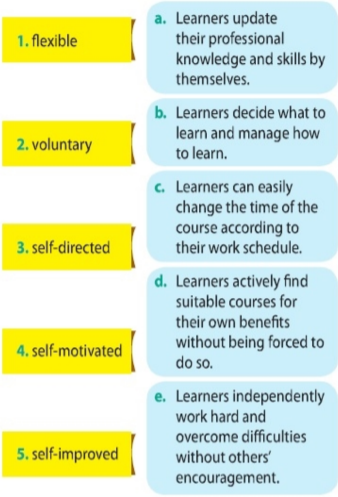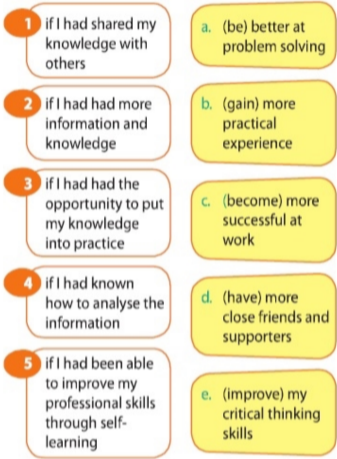Đừng bỏ lỡ những tính năng hấp dẫn của Baitap365.com
Unit 10: Lifelong Learning - Học suốt đời
Language - trang 60 Unit 10 SGK tiếng Anh 12 mới
Skills - trang 62 Unit 10 SGK tiếng Anh 12 mới Communication and Culture - trang 66 Unit 10 SGK tiếng Anh 12 mới Looking back - trang 68 Unit 10 SGK tiếng Anh 12 mới Project - trang 69 Unit 10 SGK tiếng Anh 12 mới Getting Started - trang 58 Unit 10 SGK tiếng Anh 12 mới Luyện tập từ vựng Unit 10 Tiếng Anh 12 mới Ngữ pháp: Conditional type 3 and Mixed conditional of type 2 and type 3 – Unit 10. Lifelong learning - Tiếng Anh 12 mới Vocabulary - Phần từ vựng - Unit 10 tiếng Anh 12 mớiLanguage - trang 60 Unit 10 SGK tiếng Anh 12 mới
Work in pairs. Match the characteristics of lifelong learning (1-5) with their example actions (a-e).
Vocabulary - 1
1. Work in pairs. Match the characteristics of lifelong learning (1-5) with their example actions (a-e).
(Làm việc theo cặp. Nối đặc điểm của học tập suốt đời (1-5) với ví dụ những hành động của chúng (a-e).)

Vocabulary - 2
2. Complete the sentences with the right form of the words and phrases in the box.
(Hoàn thành câu với các hình thức đúng của các từ và cụm từ trong hộp.)
|
lifelong learning self-directed learning styles self-motivated voluntary |
1. Students with __________ are good at completing challenging tasks without the encouragement of other people.
2. To become a __________ you need to learn new things __________ every single day of your life.
3. Colleges often encourage students to consolidate knowledge through __________ study.
4. Some people think that if we recognise our __________, we will learn better.
Pronunciation - 1
Intonation of questions (Ngữ âm của câu hỏi)
1. Listen and mark the rising or falling intonation on the questions.
(Lắng nghe và đánh dấu ngữ điệu tăng hoặc giảm trên các câu hỏi.)
1. A: Are teachers an important factor in students’ lifelong learning?
(Các giáo viên là một nhân tố quan trọng trong việc học tập suốt đời của học sinh phải không?)
B: Absolutely. They teach students how to learn.
(Hoàn toàn đúng. Họ dạy cho học sinh cách học.)
2. A: What is the most important requirement for this course?
(Yêu cầu quan trọng nhất đối với khóa học này là gì?)
B: Self-motivation! (Tự lực!)
3. A: Would a secondary school graduate become a better lifelong learner than a university graduate?
(Liệu một người tốt nghiệp trung học trở thành một người học tập suốt đời tốt hơn là một người tốt nghiệp đại học?)
B: I think it depends on the person’s self-motivation.
(Tôi nghĩ nó phụ thuộc vào động lực của người đó.)
4. A: Did you email your report to me? (Bạn đã gửi email báo cáo cho tôi chưa?)
B: I’m afraid not. There’s something wrong with my laptop. I’ll send it tonight.
(Tôi sợ không được. Có vấn đề với cái máy tính xách tay của tôi. Tôi sẽ gửi nó tối nay.)
5. A: How do I encourage my students to develop lifelong learning?
(Làm cách nào để khuyến khích sinh viên của tôi phát triển việc tập suốt đời?)
B: Well, just show them that learning can be fun.
(Oh, chỉ cho họ thấy rằng học tập rất thú vị.)
Pronunciation - 2
2. Work in pairs. Practise reading the short conversations in 1.
(Làm việc theo cặp. Luyện tập đọc đoạn hội thoại ngắn trong 1.)
Grammar - 1
Conditionals Type 3 (Câu điều kiện loại 3)
1. Ben is recently out of work. He is thinking about what he did or did not do in his previous job. Match the if-clauses with the results.Then write conditionals using appropriate verb forms.
(Ben gần đây không có việc làm. Anh đang nghĩ về những gì mình đã hoặc đã không làm trong công việc trước đây của mình. Khớp mệnh đề if với kết quả. Sau đó viết các câu điều kiện sử dụng các hình thức động từ thích hợp.)

Grammar - 2
2. Ben is now thinking about what he did not do in his previous job and his current situation. Write mixed conditionals, putting the verbs in brackets in the correct form.
(Ben đang suy nghĩ về những gì mình đã không làm trong công việc trước đây của mình và tình hình hiện tại của mình. Viết các câu điều kiện hỗn hợp, đưa các động từ trong ngoặc ở dạng đúng.)
1. If I (share) _________ my knowledge with others, I (have) _________ more ideas on how to find a more suitable job now.
2. If I (gain) _________ some experience in solving problems, I (be) _________ promoted to a new position by now.
3. If I (be able) _________ to put my knowledge into practice, I (have) _________ more job opportunities now.
4. If I (learn) _________ how to analyse the information, I (not need) _________ to take this course now.
5. If I (be) _________ able to improve my professional skills through self-learning, I (be) _________ a manager now.
Grammar - 3
3. Put the verbs in brackets in the correct form.
(Đặt động từ trong ngoặc ở dạng đúng.)
1. If you (learn) ________ more about how to use the Internet for studying before, you (be) ________ a successful lifelong learner now.
2. If he (know) ________ how to present his ideas in his previous job, he (have) ________ no trouble becoming a good manager.
3. She's out of work again! If she (continue) ________ improving her skills through lifelong learning, she (find) ________ new ways to make herself more employable.
4. Those engineers have failed. If they (continue) ________ learning, they (keep) ________ up with new developments and technology.
5. These people do not have good memories. If they (do) ________ more mentally challenging activities in the past, they (slow) ________ down mental deterioration.
Mẹo tìm đáp án nhanh
Search Google: "từ khóa + baitap365" Ví dụ: "Bài 5 trang 13 SGK Vật lí 12 baitap365